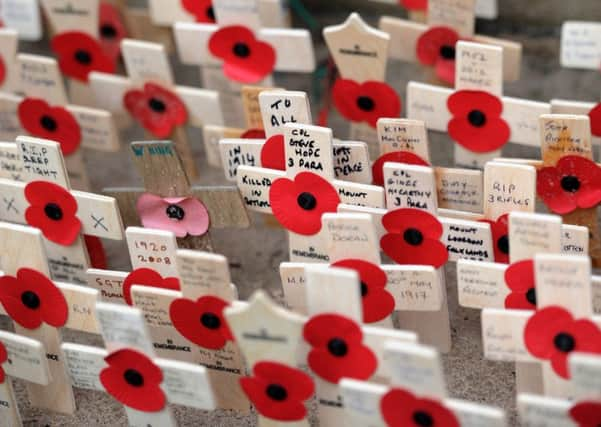Chris Bond: Remembrance Day and why we are united by a common thread of humanity


People from all walks of life were there, both young and old, wrapped up against the crisp, clear November air. We watched as the procession of ex-servicemen and women and members of various service organisations, marched to the memorial. As the clock struck 11 and the bells rang out the crowd fell silent, a scene echoed in towns and cities up and down the country.
It’s an odd sensation to stand in the middle of a busy city centre surrounded by strangers in total silence. Not everyone stopped. There were some people oblivious to what was happening keen, perhaps, to make a start on their Christmas shopping, or maybe they just weren’t bothered – after all, the First and Second World Wars happened a long time ago. But many did stop in the street to pay their respects.
Advertisement
Hide AdAdvertisement
Hide AdThere was a time, not that long ago, when some people were questioning whether we should even keep this sombre act of remembrance going, that it was time to move on.
It seems to me, though, that something has changed. Last year marked a turning point, the centenary of the start of the Great War reawakened public interest not only in this conflict, but how we remember all wars.
There has been a growing desire among people to find out what happened to their relatives. For some this has meant rummaging through notebooks whose unread, mildewed pages were gathering dust in the attic, while for others it has triggered a voyage of discovery that has taken them to battlefields and cemeteries with strange, exotic names.
The act of remembrance has become important to people. If you doubt this then you only have to look back at the phenomenal success of the poppy art exhibition outside the Tower of London, which saw four million people visit the exhibition. Wars are by their very nature destructive, but the act of remembering those who fought and, in some cases, died for their country can be a unifying one. Just as conflicts cut across class – around 17 per cent of British Army officers were killed during the First World War, compared with 12 per cent of its rank and file soldiers – so they do with race and religion.
Advertisement
Hide AdAdvertisement
Hide AdMore than half of people from ethnic minorities say they plan to wear a poppy this weekend, but this should not come as any great surprise. Muslims, Jews, Sikhs and Christians stood side by side to defend Britain during both World Wars and this shared history is part of our national identity today.
We hear a lot these days about what divides Britain’s different communities and precious little about the values we share that bring us together. Which is why it was heartening recently to see a rabbi, an imam and a vicar talking about Remembrance Day as a way of highlighting our similarities rather than our differences.
As the Rev Heston Groenwald of All Hallows Church in Leeds pointed out: “At Remembrance time, we mark that the idea that the greatest love you can show is to give your life for someone else. We are all human, regardless of our faith.”
It is not something we perhaps hear often enough.
If you stop and ask people in the street about the First World War, they will probably know about the trenches of the Western Front, and they might mention “Ypres”, “Gallipoli” and “the Somme” – names of places indelibly marked by the horrors of war.
Advertisement
Hide AdAdvertisement
Hide AdBut they probably wont know that 130,000 Sikh men took part in the conflict, just as they are unlikely to be aware of the contribution of the 400,000 Muslim soldiers who fought as part of the 1.5 million-strong army of India in the First World War.
However, a new campaign, launched by British Futures, hopes to change this by highlighting the untold, or little known, stories of Muslims who fought for Britain. Last weekend marked the anniversary of the first Victoria Cross for gallantry being awarded to a Muslim soldier, Khudadad Khan, a machine-gunner fighting on the Western Front in 1914 who, while seriously injured and under heavy fire, held off the enemy long enough for reinforcements to arrive.
Today, his portrait hangs in the India Room at Sandhurst, his story one of many being brought into the light.
I have no personal family connection to the Great War. Both of my great-grandparents were too old to fight and my grandparents were just children – though their time would come soon enough.
Advertisement
Hide AdAdvertisement
Hide AdBut last year while I was standing at the memorial in Leeds, where I will return again tomorrow, I happened to glance down at the plaque carrying the names of the fallen VC heroes from the city. One name, in particular, stood out – David Philip Hirsch.
Regular readers of this newspaper will be familiar with our Legacies of War series, chronicling different Yorkshire stories from the war. Hirsch’s was among them.
He received a commission in the Green Howards in 1915 and was sent to France. He survived the Battle of the Somme but was killed near Arras in 1917.
I didn’t know him, of course, but I have held the letters he wrote to his mother back home in Leeds.
Advertisement
Hide AdAdvertisement
Hide AdIt’s a reminder that every name on every war memorial was once a person and that each has their own story – and through the simple act of standing still and remembering, even for the briefest of moments, we share a common bond of humanity.